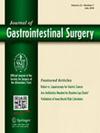Cluster analysis of hepatocellular carcinoma prognosis using preoperative alpha-fetoprotein and des-gamma-carboxy prothrombin levels: a multi-institutional study
IF 2.2
3区 医学
Q3 GASTROENTEROLOGY & HEPATOLOGY
引用次数: 0
Abstract
Background
Hepatocellular carcinoma (HCC) remains the leading cause of cancer-related mortality worldwide and is characterized by high recurrence rates after curative resection. The tumor markers des-gamma-carboxy prothrombin (DCP) and alpha-fetoprotein (AFP) are crucial for HCC diagnosis and prognosis. However, their roles in the modern era of HCC epidemiology require reevaluation.
Methods
This multi-institutional retrospective study analyzed 1515 patients who underwent hepatectomy for primary HCC. Patients were classified into 4 clusters using k-means analysis based on preoperative DCP and AFP levels. Clinicopathologic characteristics, overall survival (OS), and recurrence rate (RR) were evaluated using Cox proportional hazards models and area under the receiver operating characteristic curve (AUROC) comparisons.
Results
Cluster 3 (concurrent elevations of DCP and AFP) had the poorest 5-year OS (52.8%) and the highest RR (79.3%), whereas cluster 4 (low levels of both markers) had the most favorable outcomes, with a 5-year OS rate of 71.5% and an RR of 55.7%. Cluster 1 (elevated DCP alone) was associated with larger tumors (median of 45 mm) and more frequent vascular invasion (43%) than cluster 2 (elevated AFP alone, median tumor size of 24 mm, and vascular invasion of 36%). DCP was a stronger predictor of 5-year OS in patients with preserved liver function (AUROC, 0.63), whereas AFP was more effective in stratifying RR in patients with impaired liver function (AUROC, 0.57). Non-B, non-C hepatitis (NBNC)-related HCC exhibited a distinct biomarker profile, with an elevated DCP level correlating with a higher 5-year RR (67%) than other etiologies.
Conclusion
Our study introduces tumor marker clustering as a novel analytical approach, providing a nuanced understanding of AFP and DCP’s combined utility in predicting prognosis and recurrence. Our findings highlight the independent and complementary roles of these biomarkers, particularly in NBNC-related HCC and in cases with impaired liver function. AFP and DCP remain crucial tools for recurrence risk assessment, guiding personalized management strategies, such as surveillance, neoadjuvant therapies, and tailored postoperative interventions.

求助全文
约1分钟内获得全文
求助全文
来源期刊
CiteScore
5.50
自引率
3.10%
发文量
319
审稿时长
2 months
期刊介绍:
The Journal of Gastrointestinal Surgery is a scholarly, peer-reviewed journal that updates the surgeon on the latest developments in gastrointestinal surgery. The journal includes original articles on surgery of the digestive tract; gastrointestinal images; "How I Do It" articles, subject reviews, book reports, editorial columns, the SSAT Presidential Address, articles by a guest orator, symposia, letters, results of conferences and more. This is the official publication of the Society for Surgery of the Alimentary Tract. The journal functions as an outstanding forum for continuing education in surgery and diseases of the gastrointestinal tract.

 求助内容:
求助内容: 应助结果提醒方式:
应助结果提醒方式:


